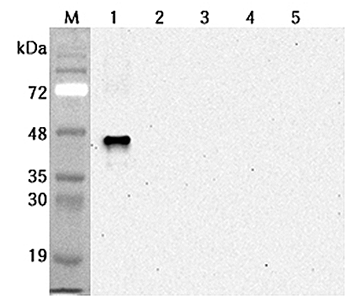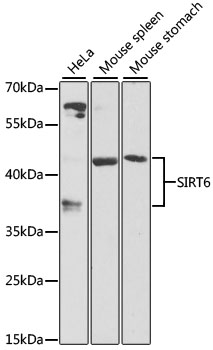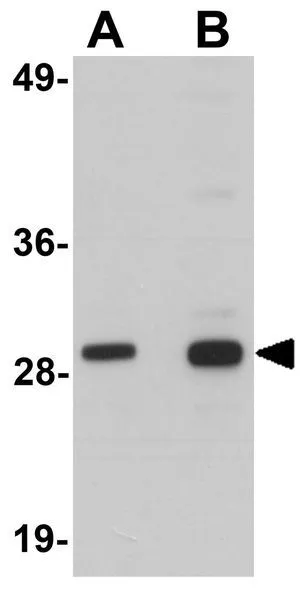
Western blot analysis using anti-Sirtuin 6 (human), mAb (S6R82-2) (Prod. No. AG-20A-0091) at 1:2000 dilution.1: Human sirtuin 6 (His-tagged).2: Human sirtuin 1 (His-tagged).3: Human sirtuin 2 (His-tagged).4: Human sirtuin 5 (His-t
anti-Sirtuin 6 (human), mAb (S6R82-2)
AG-20A-0091
ApplicationsWestern Blot, ELISA
Product group Antibodies
ReactivityHuman
TargetSIRT6
Overview
- SupplierAdipoGen Life Sciences
- Product Nameanti-Sirtuin 6 (human), mAb (S6R82-2)
- Delivery Days Customer10
- ApplicationsWestern Blot, ELISA
- CertificationResearch Use Only
- ClonalityMonoclonal
- Clone IDS6R82-2
- Concentration1 mg/ml
- Gene ID51548
- Target nameSIRT6
- Target descriptionsirtuin 6
- Target synonymsSIR2L6, hSIRT6, NAD-dependent protein deacylase sirtuin-6, NAD-dependent protein deacetylase sirtuin-6, SIR2-like protein 6, protein mono-ADP-ribosyltransferase sirtuin-6, regulatory protein SIR2 homolog 6, sir2-related protein type 6, sirtuin type 6
- HostMouse
- IsotypeIgG2b
- Protein IDQ8N6T7
- Protein NameNAD-dependent protein deacylase sirtuin-6
- Scientific DescriptionMonoclonal Antibody. Recognizes human sirtuin 6. Detects a band of ~47kDa by Western blot. Isotype: Mouse IgG2bkappa. Clone: S6R82-2. Applications: ELISA, WB. Liquid. 0.2microm-filtered solution in PBS, pH 7.4. Contains no preservatives. Sirtuin 6 (SIRT6) is a NAD-dependent protein deacetylase with activity towards Lys-9 and Lys-56 of histone H3. It modulates acetylation of histone H3 in telomeric chromatin during the S-phase of the cell cycle. It is required for genomic stability and for normal IGF1 serum levels and normal glucose homeostasis. It also regulates cellular senescence and apoptosis. Unlike most sirtuins, SIRT6 preferentially removes long-chain fatty-acyl, rather than acetyl, protein modifications. This activity regulates secretion of the inflammation-associated protein TNF-alpha. - Sirtuin 6 (SIRT6) is a NAD-dependent protein deacetylase with activity towards Lys-9 and Lys-56 of histone H3. It modulates acetylation of histone H3 in telomeric chromatin during the S-phase of the cell cycle. It is required for genomic stability and for normal IGF1 serum levels and normal glucose homeostasis. It also regulates cellular senescence and apoptosis. Unlike most sirtuins, SIRT6 preferentially removes long-chain fatty-acyl, rather than acetyl, protein modifications. This activity regulates secretion of the inflammation-associated protein TNF-alpha.
- ReactivityHuman
- Storage Instruction-20°C,2°C to 8°C
- UNSPSC41116161







